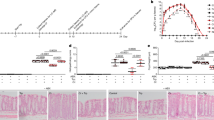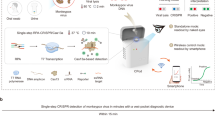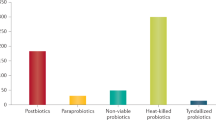Abstract
Intestinal pathogens such as Entamoeba spp. and Giardia spp. protozoans are not uncommon among rhesus macaques (Macaca mulatta) in research facilities. These infections affect the health of the macaques, potentially causing severe diarrhea, and also pose a risk of zoonotic transmission to human caretakers. Infections must therefore be treated, but no standard treatment for intestinal protozoans in macaques has been developed. Metronidazole is commonly used to treat infections with Giardia spp. and Entamoeba spp. in veterinary medicine, but evidence-based information on effectiveness and dosages for nonhuman primates is lacking, and administration of drugs to nonhuman primates is challenging. The authors designed a study to determine whether oral administration of metronidazole dissolved in drinking water would be successful in rhesus macaques. They monitored daily fluid intake of macaques given water with or without metronidazole and with or without flavored syrup. Metronidazole addition, with or without flavored syrup, resulted in a decrease in fluid intake. Although it was possible to administer metronidazole in drinking water to some macaques, the authors conclude that this strategy is not a practical clinical method because of variation in the amount of water and metronidazole ingested by the macaques.
This is a preview of subscription content, access via your institution
Access options
Subscribe to this journal
We are sorry, but there is no personal subscription option available for your country.
Buy this article
- Purchase on Springer Link
- Instant access to full article PDF
Prices may be subject to local taxes which are calculated during checkout

Similar content being viewed by others
References
Levecke, B. The Importance of Gastrointestinal Protozoa in Captive Non Human Primates, Dissertation, Ghent Univ., (2010).
Berrilli, F. et al. Giardia duodenalis assemblages and Entamoeba species infecting non-human primates in an Italian zoological garden: zoonotic potential and management traits. Parasit Vectors. 4, 199 (2011).
Hubbard, G.B. Protozoal diseases of nonhuman primates. Semin. Avian Exotic Pet Med. 4, 145–149 (1995).
Jiang, B., Yang, G.Y., Yu, X.M., Cheng, A.C. & Bi, F.J. A case report: Entamoeba histolytica infections in the rhesus macaque, China. Parasitol. Res. 3, 915–917 (2008).
Kramer, J.A., Hachey, A.M., Wachtman, L.M. & Mansfield, K.G. Treatment of giardiasis in common marmosets (Callithrix jacchus) with tinidazole. Comp. Med. 59, 174–179 (2009).
Tangtrongsup, S. & Scorza, V. Update on the diagnosis and management of Giardia spp infections in dogs and cats. Top. Companion Anim. Med. 25, 155–162 (2010).
Verweij, J.J. et al. Entamoeba histolytica infections in captive primates. Parasitol. Res. 90, 100–103 (2003).
Johnson-Delaney, C.A. Parasites of captive nonhuman primates. Vet Clin. North Am. Exotic Anim. Pract. 12, 563–581 (2009).
Vernes, M.K. & Louwerse, A.L. Food enrichment. in BPRC's Enrichment Manual for Macaques and Marmosets 71–79 (BPRC, Rijswijk, The Netherlands, 2010).
Bernacky, B.J., Gibson, S.V., Keeling, M.E. & Abee, C.R. Nonhuman primates. in Laboratory Animal Medicine 2nd edn. (eds. Fox, J.G., Anderson, L.C., Loew, F.M. & Quimbly, F.W.) 726 (Academic, Orlando, FL, 2002).
Peisert, W., Taborski, A., Pawlowski, Z., Karlewiczowa, R. & Zdun, M. Giardia infection in animals in Poznan Zoo. Vet. Parasitol. 13, 183–186 (1983).
Toft, J.D. & Eberhard, M.L. Parasitic diseases. in Nonhuman Primates in Biomedical Research: Diseases (eds. Bennett, B.T., Abee, C.R. & Henrickson, R.) 113–115 (Academic, San Diego, CA, 1998).
Kerr, G.R. Nutritional requirements of subhuman primates. Physiol. Rev. 52, 415–467 (1972).
Schroederus, K.M., Gresl, T.A. & Kemnitz, J.W. Reduced water intake but normal response to acute water deprivation in elderly rhesus monkeys. Aging (Milano) 11, 101–108 (1999).
Suzuki, M.T., Hamano, M., Cho, F. & Honjo, S. Food- and water- intake, urinary and fecal output, and urinalysis in the wild-originated cynomolgus monkeys (Macaca fascicularis) under the indoor individually-caged conditions. Jikken Dobutsu. 38, 71–74 (1989).
Zorbas, Y.G., Kuznetsov, N.A. & Yaroshenko, Y.N. Water metabolic parameter changes in rhesus monkeys during exposure to prolonged restriction of motor activity. Biol. Trace Elem. Res. 57, 169–181 (1997).
Natelson, B.H. & Bonbright, J.C. Jr. Patterns of eating and drinking in monkeys when food and water are free and when they are earned. Physiol. Behav. 21, 201–213 (1978).
Pace, N., Hansen, J.T., Rahlmann, D.F., Barnstein, N.J. & Cannon, M.D. Preliminary observations of some physiological characteristics of the pig-tailed monkey, Macaca nemestrina. Aerosp. Med. 35, 118–121 (1964).
Scholten, P., van Leerdam, M.E. & Kuipers, E.J. Chronic diarrhoea: the importance of an accurate medical history. Ned. Tijdschr. Geneeskd. 150, 405–408 (2006).
Acknowledgements
We thank professor Johanna Fink-Gremmels and Dr. Anwar Jagessar for useful and helpful comments on this study and thank Donna Devine for editing the manuscript.
Author information
Authors and Affiliations
Corresponding author
Ethics declarations
Competing interests
The authors declare no competing financial interests.
Rights and permissions
About this article
Cite this article
Labberton, L., Bakker, J., Klomp, R. et al. Challenges in oral administration of metronidazole dissolved in drinking water to rhesus monkeys (Macaca mulatta). Lab Anim 42, 213–216 (2013). https://doi.org/10.1038/laban.264
Received:
Accepted:
Published:
Issue Date:
DOI: https://doi.org/10.1038/laban.264
This article is cited by
-
GDNF gene therapy for alcohol use disorder in male non-human primates
Nature Medicine (2023)



